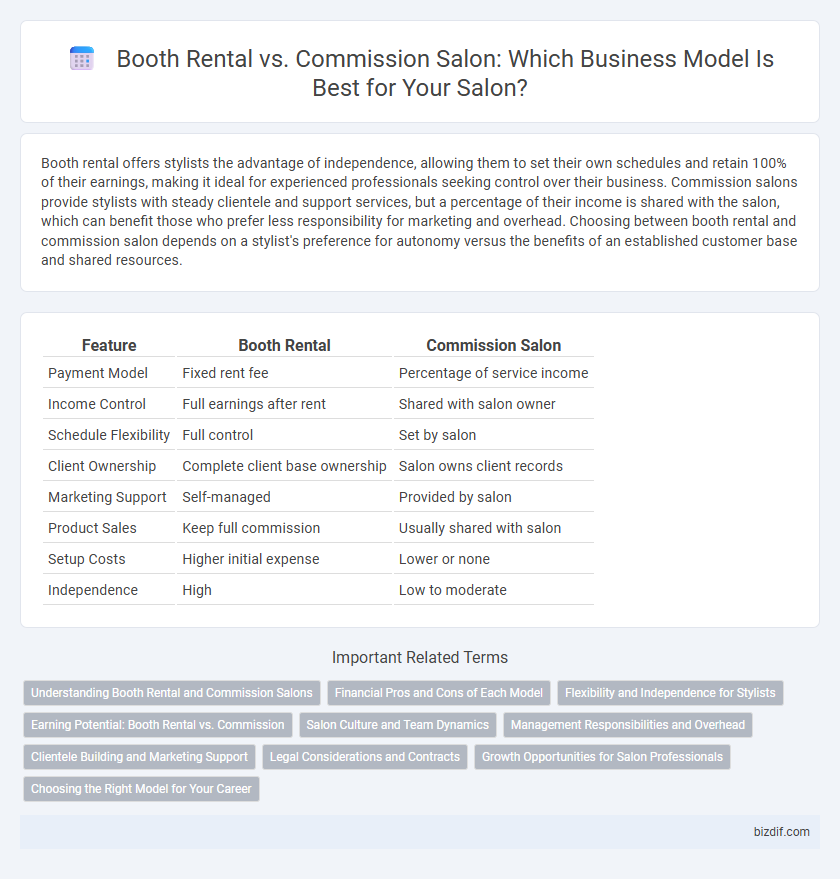Booth rental offers stylists the advantage of independence, allowing them to set their own schedules and retain 100% of their earnings, making it ideal for experienced professionals seeking control over their business. Commission salons provide stylists with steady clientele and support services, but a percentage of their income is shared with the salon, which can benefit those who prefer less responsibility for marketing and overhead. Choosing between booth rental and commission salon depends on a stylist's preference for autonomy versus the benefits of an established customer base and shared resources.
Table of Comparison
| Feature | Booth Rental | Commission Salon |
|---|---|---|
| Payment Model | Fixed rent fee | Percentage of service income |
| Income Control | Full earnings after rent | Shared with salon owner |
| Schedule Flexibility | Full control | Set by salon |
| Client Ownership | Complete client base ownership | Salon owns client records |
| Marketing Support | Self-managed | Provided by salon |
| Product Sales | Keep full commission | Usually shared with salon |
| Setup Costs | Higher initial expense | Lower or none |
| Independence | High | Low to moderate |
Understanding Booth Rental and Commission Salons
Booth rental in salons offers stylists the freedom to operate as independent contractors, paying a fixed fee to use the space while retaining full control over their earnings and schedules. Commission salons provide stylists with a percentage of the services and product sales, often including salon management, marketing, and client booking support. Understanding the financial implications, stylist independence, and business responsibilities is crucial when choosing between booth rental and commission salon models.
Financial Pros and Cons of Each Model
Booth rental offers salon professionals fixed monthly expenses and full control over their earnings, promoting independent financial growth but requiring self-managed taxes and marketing costs. Commission salons provide a steady client base and shared overhead expenses, reducing upfront financial risks but limiting income potential due to percentage-based commissions. Evaluating booth rental versus commission structures depends on a stylist's preference for autonomy versus financial predictability and support.
Flexibility and Independence for Stylists
Booth rental salons offer stylists greater flexibility and independence by allowing them to set their own schedules, choose their service prices, and retain the full revenue from their clients. Commission-based salons typically impose fixed working hours and require stylists to share a percentage of their earnings with the salon, limiting financial control and autonomy. This enhanced flexibility in booth rental models empowers stylists to build personalized brands and manage their businesses with fewer restrictions.
Earning Potential: Booth Rental vs. Commission
Booth rental offers unlimited earning potential since stylists keep 100% of their service fees but must cover all expenses like supplies and rent, leading to higher financial risk and responsibility. Commission salons provide a steady income with stylists earning a fixed percentage, typically between 40% and 60%, of each service, reducing overhead costs and financial uncertainty. Stylists aiming for maximum income control often prefer booth rental, while those seeking consistent earnings and fewer financial obligations gravitate toward commission-based arrangements.
Salon Culture and Team Dynamics
Booth rental salons foster individual entrepreneurship by allowing stylists to operate independently, which can lead to a more autonomous but less cohesive salon culture. Commission-based salons promote teamwork and collaboration among stylists, enhancing a unified salon culture with shared goals and mutual support. The choice between booth rental and commission models significantly impacts team dynamics, influencing communication, mentorship opportunities, and overall workplace atmosphere.
Management Responsibilities and Overhead
Booth rental salons shift management responsibilities and operational costs such as utilities, supplies, and marketing to the stylist, resulting in higher overhead for individual renters. Commission salons typically handle these management duties centrally, absorbing expenses like product inventory, facility maintenance, and staff scheduling, which reduces stylist overhead but decreases their share of earnings. Understanding these dynamics helps stylists choose between the independence and financial control of booth rental versus the support and stability offered by commission-based salons.
Clientele Building and Marketing Support
Booth rental salons offer professionals full control over their clientele building by allowing independent marketing strategies tailored to personal branding. Commission salons provide built-in client access through established marketing efforts and salon reputation but limit individual promotional flexibility. Choosing between the two depends on whether an artist prioritizes autonomy in client acquisition or benefits from a collective marketing system.
Legal Considerations and Contracts
Booth rental agreements require independent contractors to understand local licensing laws, tax responsibilities, and insurance coverage, ensuring compliance without employer liability. Commission salons typically involve employee contracts with specified wage laws, workers' compensation, and employer tax obligations, necessitating clear employment terms and conditions. Both arrangements demand carefully drafted contracts outlining payment structure, termination clauses, and liability to protect all parties legally.
Growth Opportunities for Salon Professionals
Booth rental offers salon professionals greater independence and the ability to build their personal brand, which can lead to increased client retention and higher income potential. Commission salons provide structured support, steady client flow, and access to marketing resources, fostering skill development and consistent revenue growth. Choosing between booth rental and commission models depends on individual goals for autonomy, financial growth, and professional development within the salon industry.
Choosing the Right Model for Your Career
Choosing between booth rental and commission salon models depends on your career goals, financial stability, and desired level of independence. Booth rental offers stylists full control over their schedule and income but requires managing business expenses and client acquisition, while commission salons provide steady clientele, marketing support, and fewer administrative responsibilities at the cost of sharing earnings. Evaluating factors like personal business skills, income expectations, and work-life balance is essential to aligning your salon career with the right model.
Booth Rental vs Commission Salon Infographic

 bizdif.com
bizdif.com